As any dog owner knows, sometimes your dog is doing something, like making noises in their sleep, and you want to know why it is that he/she does that.
In our modern digital age, we often turn to the Internet for things we don't know the answer to, and this of course, includes all our dog-related questions!
The Most-Searched Questions About Dogs On The Planet
So, you ask Google. Lucky for us, Google has shared the top dog questions of 2023. Want to know what your fellow dog owners are wondering about? Some of the questions may surprise you. Check out the list (and the answers!) below.
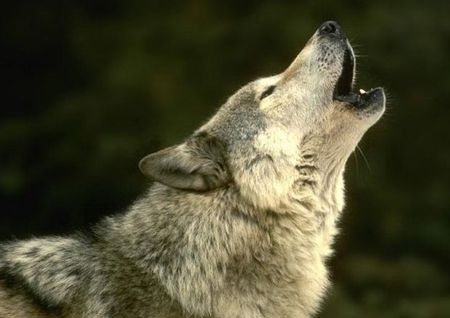
What does a dog howling mean?
Is your dog connecting with his inner wolf by howling? Howling, along with barking, whining and other noises is simply one way that dogs have of communication with each other, and us. Dogs howl to make their presence known and to mark their territory. Dogs also may howl for attention, or wail as a response to loud or high-pitched noises, like an ambulance siren. Sadly, for fantasy lovers, howling has nothing to do with the full moon; it’s just your dog’s way of saying (loudly), “Hello!”.
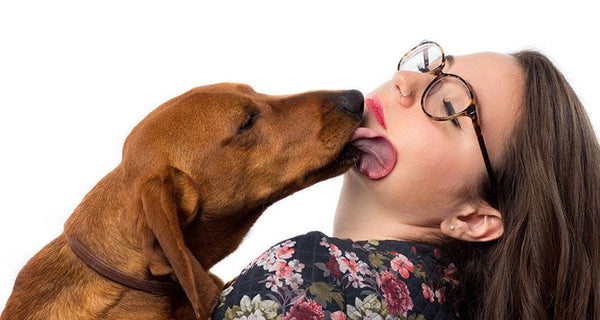
Why do dogs lick?
Like barking and howling, licking is a form of dog communication. Dogs are instinctually drawn to licking right from birth when a mummy dog is licking the babies to feed and care for them. This habit translates into a submissive gesture of affection in older dogs.
Dogs also do like the salty taste of our skin, which is why some dogs love giving kisses after a workout (Yuck!).
But mostly, if your dog is licking your face, they are just trying to say, “I love you.”
Awwwww!
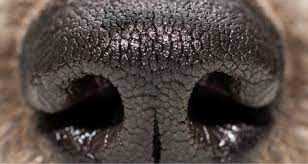
Why do dogs have wet noses?
A dog’s ability to detect scents is up to 10,000 time more sensitive than the human nose. As an example, they can sniff out one rotten apple among 2 MILLION barrels of apples. A wet nose enhances the ability to trap olfactory chemicals in the secretions produced in the glands of the nose.
Some dogs lick their nose, contributing to the “wet nose” look and enhancing the process of scent detection as those chemicals are processed in olfactory centres in the roof of their mouths. Dogs also produce more secretions from their nose as a way of regulating body temperature.
Sweat glands are found in the feet and nose and as such, a wet nose helps keep them cool. Should I worry if my dog has a dry nose? Nope! If the dog is otherwise happy and healthy, without dried discharge around the nostrils, a dry nose is not an indicator of illness.

Is sleeping with my dog a good idea?
With 55% of pet owners sharing their bed with at least one dog, is this a good idea or not?
While there has been debate surrounding the subject for years, many studies find that sleeping with your pet can be good for you.
A dog’s body warmth, steady heartbeat and protective nature can make co-sleeping with them feel safe and cosy. Research has shown that sleeping with your dog is beneficial as it, reduces depression, Promotes Theta Brainwaves, Increases sense of security, Eases Insomnia, Diminishes Nightmares, Decreases loneliness, Improves sleep quality, Reduces stress, Lowers Blood Pressure, Strengthens bonds with your dog, Promotes a Healthy Heart, Reduces Allergies later in life, Provides Better overall health.
Why do dogs eat grass?
Most veterinarians agree grass eating seems to be a way for dogs to relieve gastrointestinal symptoms, parasites or possibly infections. Another theory is that dogs are craving micronutrients found in leafy plants. Finally, dogs may eat grass simply because they like it.
Do dogs dream?
We’ve discovered that dogs and humans share many similar characteristics when sleeping and possibly dreaming. For most dogs, dreaming should occur about 20 minutes after they begin to doze. You’ll notice shallow, irregular breathing followed by muscle twitching and eye movements behind closed eyelids.
The real question is what do dogs dream about?
Why do dogs have whiskers?
Most dogs have these long, stiff hairs projecting from their jaw, muzzle and above their eyes. Whiskers are highly sensitive and help inform the dog about surrounding objects, air movements and more. You can also tell a dog is nervous or scared if the whiskers are pointing forward at a potential threat. Whatever you do, don’t trim or pluck whiskers because they serve an important information source for dogs.
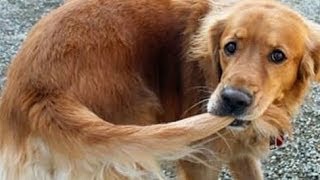
Why do dogs chase their tails?
Other than for grooming or injury reasons, it is abnormal for dogs to consistently chase their tails. It can occur as an attention-getting activity or can escalate to a compulsive behaviour that interferes with normal activities. Compulsive behaviours are similar to obsessive compulsive disorder (OCD) in people and one theory is that it results in an increase in endorphins in the brain thus acting to reinforce pleasure for the behaviour.
How do you stop dogs from digging?
Dogs dig because it is fun or for exploration. This is a normal behaviour but will escalate if unmanaged. Don’t allow dogs in areas unsupervised where they have dug before, block off problem areas, be in the yard to prevent digging and engage your dog with activities. You can provide a digging box or area with sand or dirt that your dog can easily dig in. You can encourage its use by burying favourite toys (first shallow then more deeply) in the box.
How do you introduce dogs to … (babies, cats, etc.)?
The first rule of introducing dogs to babies or new pets is supervision. Next, take it slow. Keep the parties separated and allow them to see, hear and smell the visitor. Back off at any sign of anxiety, fear, or threats. If a new baby is at the hospital, try bringing home a blanket with the newborn’s smell for your pet. Make sure to keep food and prized possessions away during introduction.
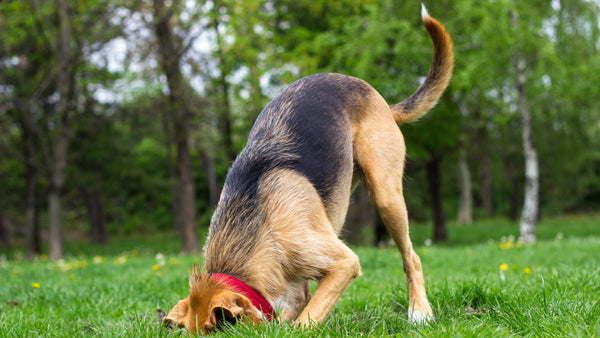
Why do dogs bury bones?
Animals frequently create food stores (hidey holes for later). Even though you may supply all the food your dog may want, it is difficult to break a natural, instinctual behaviour. When dogs bury bones, they’re making an instinctual deposit to protect a future meal or prized possession.
Can I feed my dog human food?
While it is generally not recommended to feed your dog a diet consisting solely of human food, there are certain human foods that can be safe and even beneficial as occasional treats or additions to their regular dog food. However, it's important to be aware that some human foods can be toxic or unhealthy for dogs. Read more on foods your dog should never eat.
Remember, treats or additions of human food should not exceed 10% of your dog's daily calorie intake, and it's important to maintain portion control to avoid weight gain or nutritional imbalances. Always introduce new foods gradually and monitor your dog for any adverse reactions or digestive issues.
What is the most popular dog breed?
The popularity of dog breeds can vary depending on the region and year, but here are some of the most consistently popular dog breeds globally, and the most affectionate dog breeds too:
Labrador Retriever: Known for their friendly and outgoing nature, Labs are popular as family pets and working dogs.
German Shepherd: Intelligent and versatile, German Shepherds are often used as police and service dogs. They are also loyal family companions.
Golden Retriever: Friendly, intelligent, and highly trainable, Golden Retrievers are beloved for their affectionate nature and make excellent family pets.
How long do dogs live?
The lifespan of a dog can vary depending on several factors, including breed, genetics, size, overall health, and care provided. On average, dogs live between 10 and 13 years. However, it's not uncommon for some small dog breeds to live into their late teens or early twenties, while larger breeds generally have shorter lifespans, typically ranging from 8 to 12 years.
It's worth noting that these are general estimates, and individual dogs may fall outside of these ranges.
Additionally, various factors such as nutrition, exercise, veterinary care, and overall well-being can influence a dog's lifespan. Providing proper care, including a balanced diet, regular exercise, routine veterinary check-ups, and a loving environment, can contribute to a longer and healthier life for your dog.
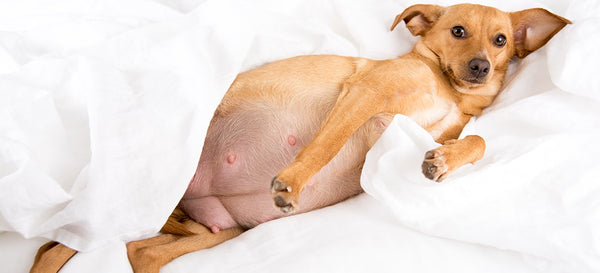
How long are dogs pregnant for?
Dogs’ pregnancies, also known as their gestation periods, usually last for approximately 58 to 68 days. The exact duration can be influenced by various factors such as the dog’s breed, litter size, and overall health. While smaller breeds might have slightly shorter gestation periods, larger breeds may have somewhat longer ones.
What colours can dogs see?
Dogs are not colourblind, but their colour vision differs from humans. They perceive fewer colours, mainly in shades of blue and yellow. This limited colour spectrum is due to the presence of only two types of colour receptors in their eyes, compared to humans’ three. Owners can use this knowledge when selecting toys, bedding, and other items for their pets, choosing colours that are more visually appealing to dogs.
Why do dogs eat poop?
Eating poop known as Coprophagia, occurs due to various factors, such as stress, boredom, or nutritional imbalances. Eating poop can also be a learned behaviour from their mother during puppyhood.
If your dog persistently eats poop, (theirs or another dogs) consult a veterinarian to identify and address any underlying issues and consider implementing behaviour modification techniques. Try teaching them to eat healthy like Farmer Pete’s 100% natural treats.
Conclusion
There are many questions regarding dogs, and this is not an exhaustive list, just the most popular questions asked. Consult your vet is you have concerns if your dog is presenting with strange or unusual behaviour.



